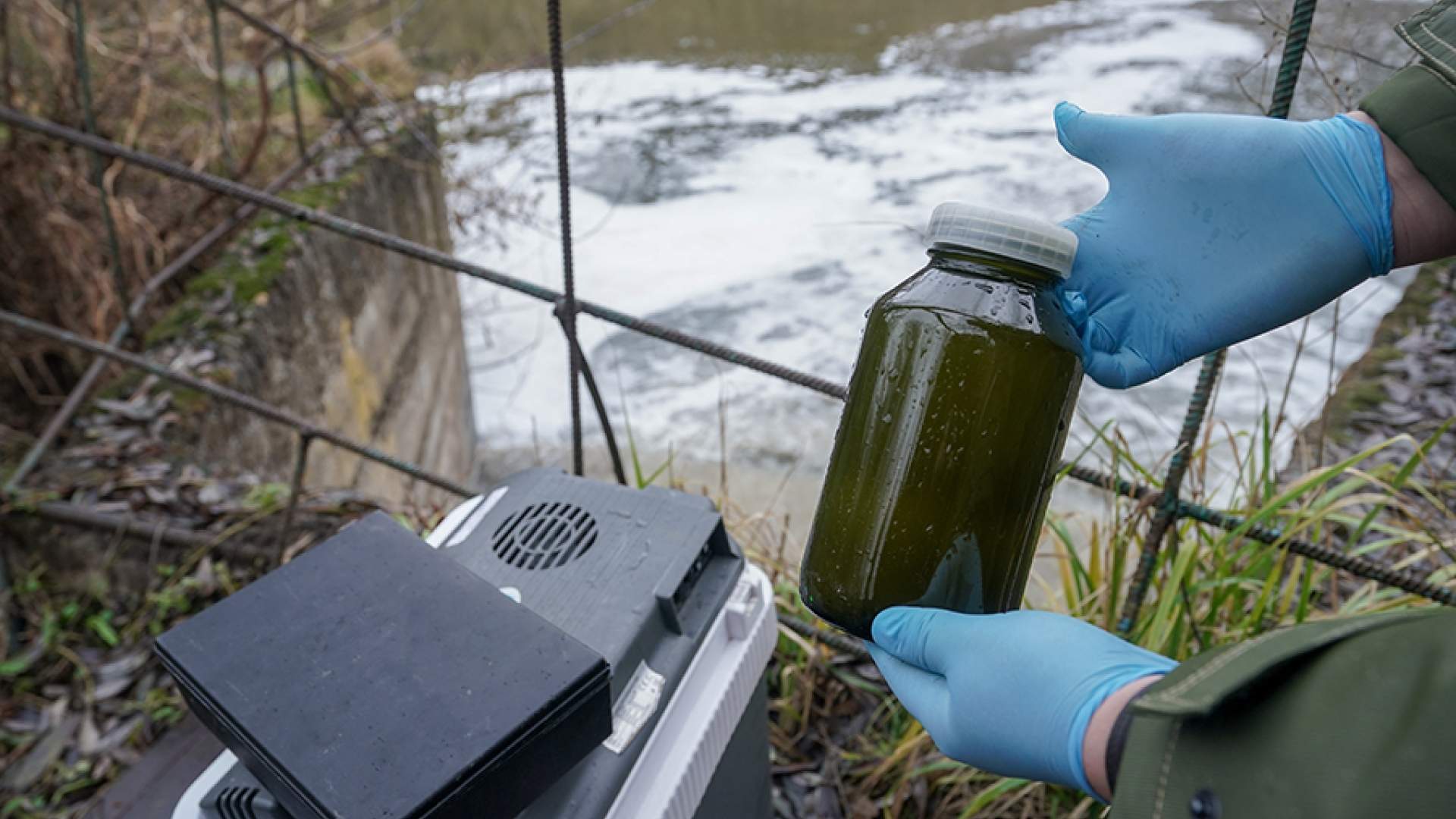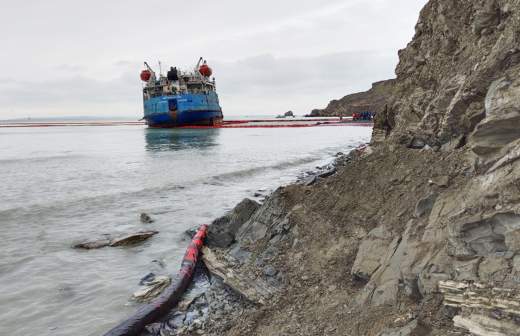Fat test: who pollutes the environment in Stupino

Residents of the village of Tatarinovo in the Stupino urban district complained of huge environmental problems.: A number of enterprises allegedly dump fat-containing waste directly into the river. At the same time, the sewage treatment plants are malfunctioning, although the administration, according to local residents, does not recognize this. Problems with sewage treatment plants, however, are not at all surprising: they are typical for many small settlements throughout Russia. Izvestia dealt with the situation.
What the Stupino check revealed
In mid-April, Alexander Kogan, deputy chairman of the State Duma Committee on Ecology, Natural Resources and Environmental Protection, visited the village of Tatarinovo in the Stupino urban district of the Moscow Region at the request of local residents. There are many communal problems, including those threatening the environment.
"Signs of the following violations were found: the discharge of detergents — shampoo — into the gutter without proper cleaning; illegally laid pipes directing drains into the Vostets River, including from the territory of sewage treatment plants; enterprises systematically drain fat—containing waste," Alexander Kogan told Izvestia. — In particular, a well overflowing with grease was found, which indicates a lack of proper disposal.
According to him, the sewage treatment plants have a critical degree of wear. And near them "there is a pipe that directs drains bypassing sewage treatment plants," which leads to direct environmental pollution.
"The Ministry of Ecology of the Moscow Region, together with accredited laboratories, will investigate the identified signs of violations of environmental legislation," said Alexander Kogan. — In the near future, samples will be taken and the necessary analyses will be carried out to establish all the circumstances. After that, regulations will be prepared to eliminate violations, and administrative proceedings will be initiated against those responsible.
Local resident Sergey Volostnov confirmed to Izvestia that there are huge problems in Tatarinovo. According to him, this year a fish died in the Vostets River — and this was not the first time. Sergei Volostnov claims that liquid is allegedly flowing into the river directly from the enterprises, and the sewage treatment plants have "stopped."
— I demonstrated the problems to Alexander Kogan: I put my hand right into the water, ran along the bottom and took out the fat from there. One of the companies that can produce such discharges is Tastes of Health," says a local resident. — This company is located right next to the boiler room. When we got there, they asked me if there was always such a smell. If you open the wells from this enterprise, they will be full of fat. All this goes directly past the sewage treatment plants.
Presumably, the second organization in question is Fresh Secret (Satellite LLC), a salad production company. Izvestia sent questions to both Tastes of Health and Fresh Secret.
Sergei Volostnov claims that he repeatedly contacted the local administration, showed both photos and videos, but these statements did not lead to anything. However, on Friday, according to him, employees of the Ministry of Ecology of the Moscow region arrived to take samples from the Vostets River upstream and downstream. He notes that experts were surprised by the strong unpleasant odor when they took samples upstream.
Which companies are suspected of dumping
The company PK "Tastes of Health" LLC is a fairly large producer of vegetable oil: pumpkin, flax, sesame, etc. Production capacity, according to open data, is 300 thousand bottles per year. This year, an expansion is expected: they have been allocated 1 hectare for 1 ruble in the neighborhood, presumably for warehouses. In the promotional materials, the company emphasizes the "ecological purity" of its products, claims that everything is made on "modern equipment and meets the requirements of international and European standards."
The company confirmed to Izvestia that samples were taken near the production buildings, but stressed that this was not done where waste is being dumped directly.
"We'll do it all over again and let you know," the company said. They said that disposal takes place according to the rules, but refused to tell in more detail how exactly this is done.
In the register of control and supervisory measures of the Prosecutor General's Office of the Russian Federation, there are about 30 inspections in relation to PK Tastes of Health LLC. The most recent entry is from April 9, 2025, but this is a warning in connection with the non—use of land. It is precisely such warnings that are written out the most. At the end of March 2025, the requirements of the supervisory authorities concerned the safety of production of fat and oil products, and in September 2024, the inadmissibility of violations of sanitary and epidemiological safety requirements during production.
Judging by the registry, there were no environmental legislation checks against the company.
It was not possible to find similar checks in open sources regarding Satellite LLC. The company did not respond to questions from Izvestia.
Rusty water — due to holes
Another problem that was raised by local residents during the parliamentary inspection concerned water quality. It was claimed that technical water unsuitable for drinking, hygiene and cooking was supplied to the system. According to Sergey Volostnov, it is noticeable visually: it is orange.
The information was only partially confirmed: the office of State Duma Deputy Alexander Kogan told Izvestia that two holes had been found in the cold water pipes. Through them, soil entered the tap water and was supplied through pipes. Vodokanal has already started the repair work.
However, the problems don't end there either. Sergey Volostnov claims that the sewage treatment plants themselves are out of order. This is a municipal facility, it was put into operation back in the 70s. In recent years, the facilities have struggled to cope even with waste from residential buildings, and the drains of enterprises cannot withstand at all. At the same time, the administration, says the interlocutor of Izvestia, has been sending answers over the past two years that everything is working normally.
Izvestia sent a request to the Ministry of Ecology of the Moscow region, the administration of Stupino, to the deputies of this locality, but at the time of publication of the material they had not received any responses.
What is the situation with sewage treatment plants in Russia
Elena Sharoikina, Chairman of the commission of the Public Chamber of the Russian Federation on Ecology and Sustainable Development, notes that most sewage treatment plants were built in the 1970s and now, with the exception of cities with millions, they are "worn out and in extremely unsatisfactory condition."
— The situation in small towns and rural settlements is very difficult. As a rule, small—capacity water treatment facilities are used there, up to 5,000 cubic meters per day," she told Izvestia. — The unit cost of building such structures is 1.5–2 times higher than that of high-performance structures, and regular maintenance also costs money.
Elena Sharoikina added that such small sewage treatment plants, as a rule, do not purify water up to fisheries standards, however, regulatory authorities do not check all local treatment systems. She calls the problem "acute and relevant for the whole country."
At the same time, huge amounts of money are being allocated for the modernization of municipal infrastructure: by 2030, a total of 4.5 trillion rubles will be allocated for these purposes, and measures will be developed to stimulate regional investments in the modernization of wastewater treatment plants.
— In general, the structural reforms of the construction industry and the housing and communal services industry over the past 10 years have led to noticeable results, however, today more than 1,000 small towns and large working-class towns with a population of over 5,000. residents do not have effective sewage treatment plants, and wastewater is discharged into water bodies without treatment or transported by sewage disposal machines to landfills," the expert added.
Moreover, there is some confusion in the rationing of wastewater discharges, which is regulated by various agencies: discharges to cultural and domestic reservoirs are regulated by Rospotrebnadzor, to fisheries reservoirs by the Ministry of Agriculture, and to specially protected water bodies by the Ministry of Natural Resources.
— In the new federal project "Water of Russia", all indicators are again aimed only at reducing the discharge of contaminated wastewater into water bodies, at the construction and modernization of sewage treatment plants, as well as at educational events, including cleaning the shores of water bodies from debris. And again, this applies to the housing and communal services system only in regional capitals and major Russian cities," added Elena Sharoikina. — It is necessary to find a solution as soon as possible to the problem of designing and constructing sewage treatment plants in thousands of small towns, work settlements and rural settlements, most of which are located on the banks of small rivers.
Переведено сервисом «Яндекс Переводчик»







